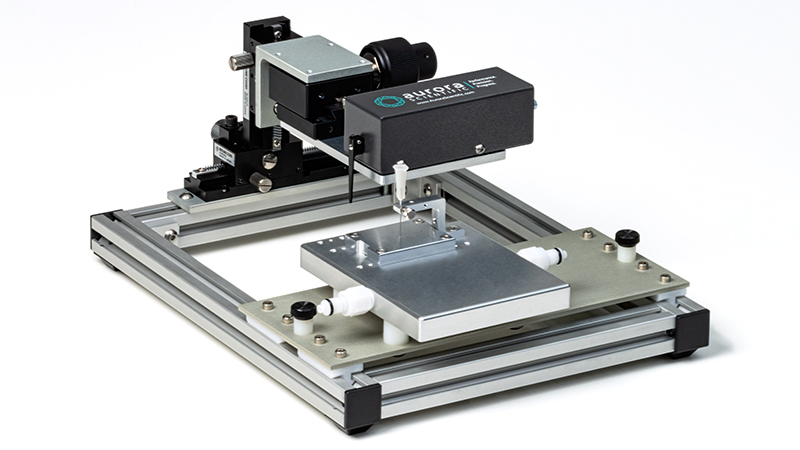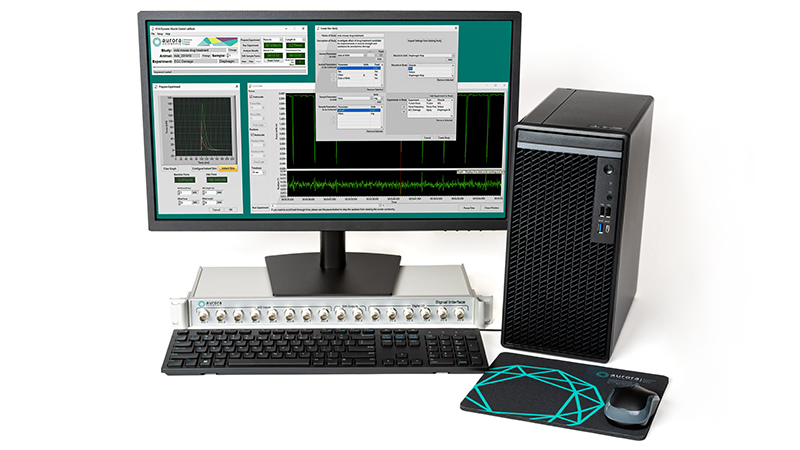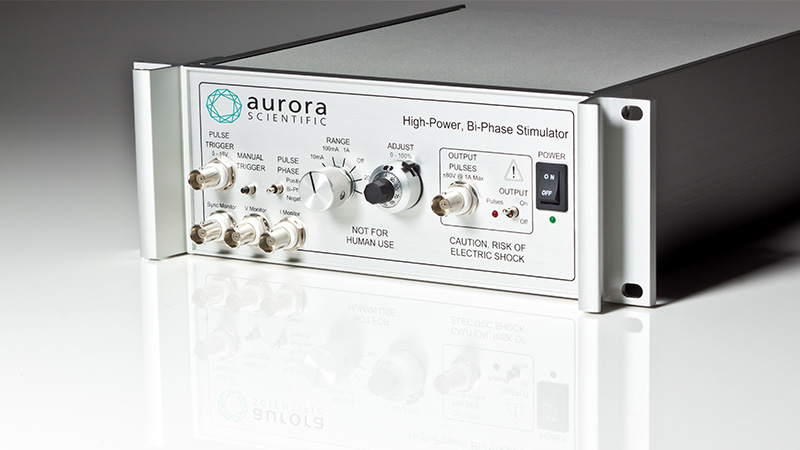1300A
3-in-1 Whole Animal System for Mice
The 3-in-1 Whole Animal System provides flexible and accurate measurement of rodent muscle properties in-situ, in-vivo and in-vitro.
The 1300A is a high performing, precise test system, giving researchers a simple method to test tensile and other mechanical properties of muscle. By combining in-situ, in-vivo and in-vitro muscle tests using one simple platform, researchers can capture a complete picture of muscle physiology in rodent subjects. The test systems come with either a mouse or rat apparatus, complete with temperature-controlled animal and limb plates designed to support and fix the animal and limb being tested. The system can be converted to an isolated (in-vitro) muscle test system with the attachment of an optional 25mL bath. Aurora Scientific’s flagship Dual-Mode lever system is also included, permitting measurement and control of both force and length.
Conveniently, muscle samples are attached at only one point to measure force and length, saving time and increasing productivity. This system also includes our high-power, bi-phasic stimulator and all required electrodes.
Control and analysis software comes pre-loaded on a custom PC, making the process of experimental setup, data collection and data analysis consistent and reliable.
With our control and analysis software (DMC/DMA), parameters such as resting length, resting force, stimulation and the actual test protocol are set and ready to use. An extensive library of standard experimental protocols such as twitch, tetanus, fatigue, force-frequency, force-velocity, stiffness and work loops are provided with the system.

mouse limb plate for in-situ protocols

mouse foot plate for in-vivo protocols

horizontal bath for in-vitro protocols
NEW! Order this system with the 150A Integrated Muscle Test Controller. The 150A is a single unit that combines a lever system, stimulator and USB DAQ card into a single controller. This results in a smaller footprint system with minimal cabling that is portable and can be controlled with laptop! When requesting information or pricing, please reference Model 1300B – Integrated 3-in-1 Whole Animal System for Mice.
Tell the Whole Story – Live Animal & Isolated Tissue in One
The three system configurations allows the researcher to work with a broad range of muscle types, providing a convenient platform for compound screening, phenotype evaluation and comparison of murine models; all within one system.
High Throughput Software Capability
Experience high-throughput data analysis, including batch processing and multi-parameter calculations for hundreds of muscle samples within minutes. Downstream analysis can be completed within Aurora Scientific DMC/DMA software or exported to your analysis program of choice.
Standard Protocol Library
The protocol library includes a variety of muscle experiments for mouse in-vitro studies. Protocols include system operation and data acquisition settings optimized for sample type and measurement needs. Custom protocols can be added to streamline system operation with multiple lab members.
Stories of Success
1300A – 3-in-1 Test System Helps Major Pharmaceutical Companies Dramatically Improve Throughput
CHALLENGE
Several large, Fortune 500 pharmaceutical companies sought a way to quickly screen large groups of mice that had been treated with new experimental compounds/therapies. Existing equipment in house was either unavailable or difficult to use and lacked the capabilities needed to meet throughput demands. The precision of any in house equipment was also questionable.
SOLUTION
With the 1300A 3-in-1 System, Aurora Scientific provides researchers with a cost effective alternative, enabling quick, easy measurement of intact and isolated muscle function. Designed for in-vivo, in-vitro and in-situ testing, the 3-in-1 system is ideally suited for experimental protocols which require quick transitions between configurations. Combined with the ability to assess aggregate skeletal muscle function without surgery, sample throughput is further enhanced and scientists are able to meet the testing demands of large animal colonies. The system’s high throughput analysis module continues to improve productivity following experiments by providing batch processing of a large number of data files in seconds.
RESULTS
Researchers at these pharmaceutical companies saw immediate benefit from using the 1300A 3-in-1 test system, in some cases testing up to fifty mice per day and limiting the number sacrificed. Switching between the in-vitro and in-situ configurations when necessary, took only a few minutes saving the researchers time and money, which allowed them to re-invest from their budget into additional systems, further improving throughput. The high precision system permitted small but significant therapeutic changes to be resolved and potentially used in life saving human medication. Furthermore, batch processing provided time saving analysis, enabling researchers to quickly formulate conclusions. Their work led to the publication of many studies, which were presented at major international conferences. The system itself played a significant role in allowing drug DPU’s at major pharmaceutical companies to meet their goals and targets.
3-in-1 in-situ System Enables Biologist to Test Physiology of Muscle Regeneration
CHALLENGE
As a molecular and developmental biologist, Dr. Chen-Ming Fan of the Carnegie Institution for Science studies the molecular mechanisms involved in mammalian development, most notably in the musculoskeletal system. Over the years Dr. Fan has uncovered developmental mechanisms that are involved in muscle regeneration through the skeletal muscle stem cell niche, as regeneration is thought to be a recapitulation of development processes.
After identifying mechanisms that may aid in skeletal muscle regeneration, Dr. Fan needed a way to test if muscle function was improved or restored in aged and diseased mouse models.
SOLUTION
With the ability to test muscle function in-situ and in-vivo, the 1300A Whole Animal System was the logical choice for Dr. Fan to expand his research from molecular mechanisms to functional measurements. The in-situ setup would allow Dr. Fan to measure force produced by specific muscles in the hindlimb while keeping the muscle’s blood supply and nervous input intact. This represents a more physiological environment than the standard isolated muscle experiments. In addition, measurements of aggregate hindlimb function without surgery using the in-vivo setup would permit longitudinal study of muscle regeneration and functional recovery in aged and disease states.
RESULTS
Once the whole animal system was installed and demonstration complete, Dr. Fan and his students were extremely excited about the prospect of the system and began making functional measurements immediately. The lab employed the in-situ technique to measure functional recovery of the Tibialis Anterior (TA) following experimentally induced muscle injury in aged and dystrophic mice. Just over a year later, Dr. Fan’s lab published a paper in Nature Medicine citing our 1300A system. Dr. Fan stated it would not have been possible to publish this article without the 1300A whole animal system and he continues to utilize this powerful system to further test the mechanisms involved in muscle regeneration.
Select References
- Al-Sajee, Dhuha et al. “Xin-deficient mice display myopathy, impaired contractility, attenuated muscle repair and altered satellite cell functionality.” Acta Physiologica (2015) DOI: 10.1111/apha.12455
- Maino et al. “Targeted genome editing in vivo corrects a Dmd duplication restoring wild-type dystrophin expression” EMBO Molecular Medicine (2021) DOI: 10.15252/emmm.202013228
- Maino et al. “Targeted genome editing in vivo corrects a Dmd duplication restoring wild-type dystrophin expression” EMBO Molecular Medicine (2021) DOI: 10.15252/emmm.202013228
- Lonh et al. “Specific inhibition of myostatin activation is beneficial in mouse models of SMA therapy” Human Molecular Genetics (2019) DOI: 10.1093/hmg/ddy382
- VanderVeen et al. “Skeletal muscle function during the progression of cancer cachexia in the male ApcMin/+ mouse” The Journal of Applied Physiology (2018) DOI: 10.1152/japplphysiol.00897.2017
- McClenaghan et al. “Skeletal muscle delimited myopathy and verapamil toxicity in SUR2 mutant mouse models of AIMS” EMBO Molecular Medicine (2023) DOI: 10.15252/emmm.202216883
- Rooney, Jachinta and Rich Lovering “Single muscle contractile measurements in vivo and in situ.” NIH (2015) DOI: N/A
- Zhou et al. “Running improves muscle mass by activating autophagic flux and inhibiting ubiquitination degradation in mdx mice” Gene (2024) DOI: 10.1016/j.gene.2024.148136
- Alway, Stephen E. and Robert G. Cutlip “Resistance Loading and Signaling Assays for Oxidative Stress in Rodent Skeletal Muscle.” Methods in Molecular Biology Myogenesis (2011) DOI: 10.1007/978-1-61779-343-1_11
- Gallot et al. “PERK regulates skeletal muscle mass and contractile function in adult mice” The FASEB Journal (2019) DOI: 10.1096/fj.201800683RR
System Components

300E: Dual-Mode Muscle Levers
Seamless, flexible control of force and length, with the unique ability to measure one or both in a single and convenient lever system.
Learn More
605A: Dynamic Muscle Data Acquisition and Analysis System
Precise, custom software designed for real-time data acquisition, instrument control and data analysis with unique, integrative features. Includes force and SL control capability
Learn More
701C: Electrical Stimulator
Our high-powered, bi-phase stimulator designed for muscle researchers conducting the most demanding field stimulation protocols.
Learn More
809C: in-situ Mouse Apparatus
A beautifully designed, flexible apparatus for easily measuring in vitro, in situ and in vivo muscle properties in mice
Learn More
608C: LCD Monitor
A 22” widescreen LCD monitor providing high quality visualization of data collection
Explore Further

In vivo Measurement of Knee Extensor Muscle Function in Mice
Quantification of knee extensor maximal strength is imperative to understand functional adaptations to aging, disease, injury, and rehabilitation. We present a novel method to repeatedly measure in ...
Learn More
Designing an in-vivo study in DMC LabBook
This blog will provide a walkthrough of how to design a study in our Dynamic Muscle Control (DMC) LabBook software, specifically for 1300A 3-in-1 Whole Animal System in-vivo experiments.
Learn More
Talking Real Science with Chris Perry
Christopher Perry, PhD, an Associate Professor at York University with the School of Kinesiology & Health Science joined us to talk in detail about his career path that led him to study regulation of ...
Learn MoreResources
Parts & Accessories
| Model # | 1300A |
|---|---|
| 808-1 | Vertical pin clamp that utilizes a 27G hypodermic needle to immobilize the mouse knee joint during in-situ experiments. It mounts on our family of 3-in -1 apparatus. |
| 808-2 | Vertical Screw Clamp that uses sharpened, stainless steel screws and a Delrin pad to fix mouse knee joint during in-situ experiments. It mounts on our family of 3-in-1 apparatus. |
| 808-5 | Upright knee clamp designed for mouse that uses a horizontal, sharpened stainless steel screw to prevent hind limb/joint movement during in-vivo or in-situ experiments. It mounts on our family of 3-in-1 apparatus. |
| 808-6 | Upright knee clamp designed for mouse that uses a horizontal dowel pin with pad for non-invasive knee restraint during in-vivo or in-situ experiments. It mounts on our family of 3-in-1 apparatus. |
| 809C-25 | Horizontal muscle bath which replaces the animal platform on 809C apparatus for in-vitro intact muscle mechanics experiments. The bath couples to the apparatus by removing the 4 screws for the limb platform and using them to attach the bath in its place. The volume of the bath is 25mL. Tools, tubing and fittings are also provided. |
| 801-RES | 1L reservoir assembly complete with built in, oxygenating bubbler. The reservoir is meant to supply oxygenated media to the 809C-25. The reservoir has an outer glass water jacket and can be connected to a circulating water reservoir to maintain perfusate temperature. Tubing and fittings to couple the reservoir are provided. |
| 830A | Half-rack adapter that allows half-rack instruments to be mounted in standard 19” racking. Works with models: 200B, 315C/322C, 400A series, 701C and 825A. |
| 831A | Heavy gauge, steel desktop or shelf-top rack, with standard 19” width for any Aurora Scientific instruments. Available in various heights. (6U high for 1200A and 1300A, 5U high for 1400A, 1500A and 1600A systems). |

